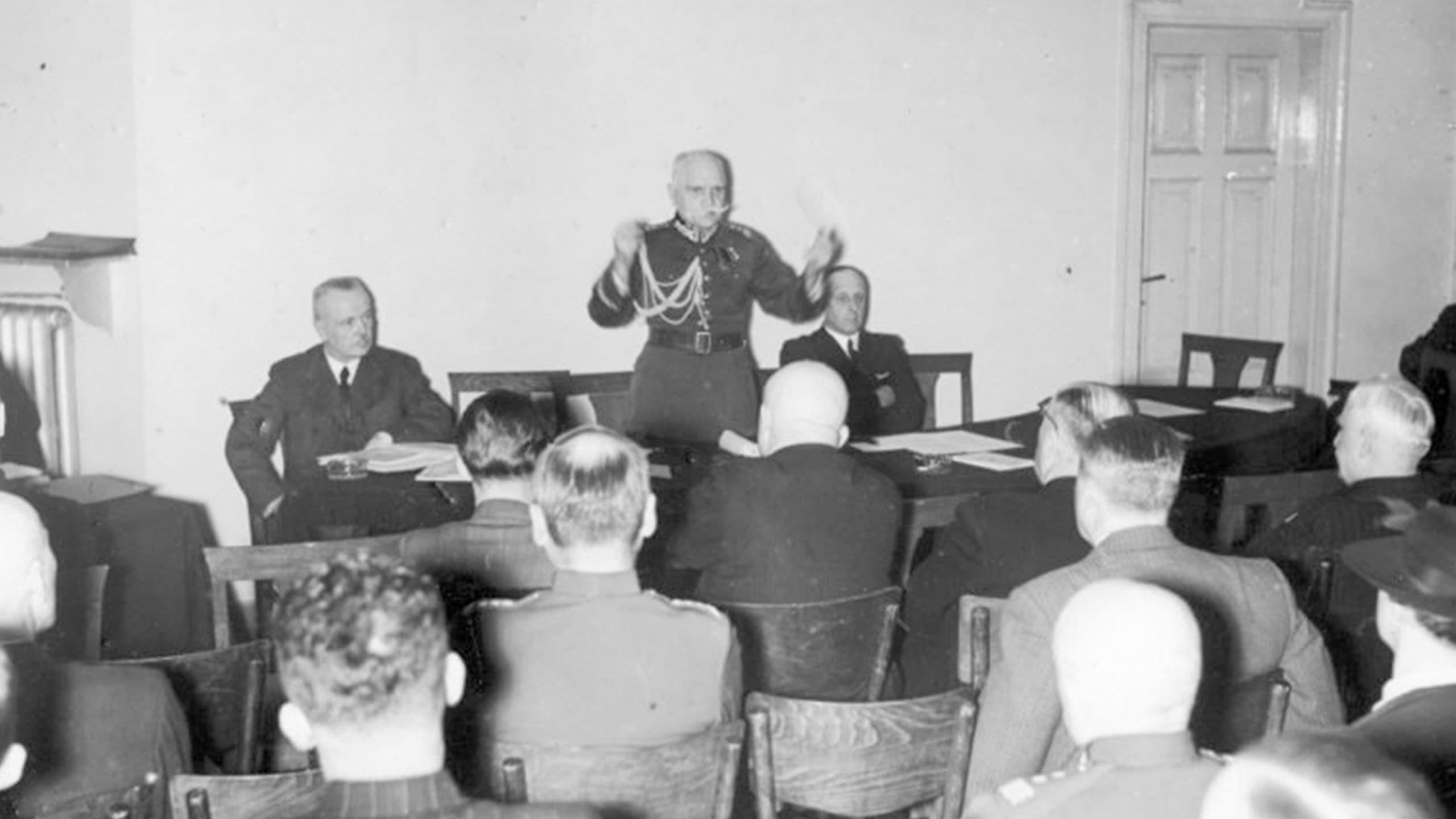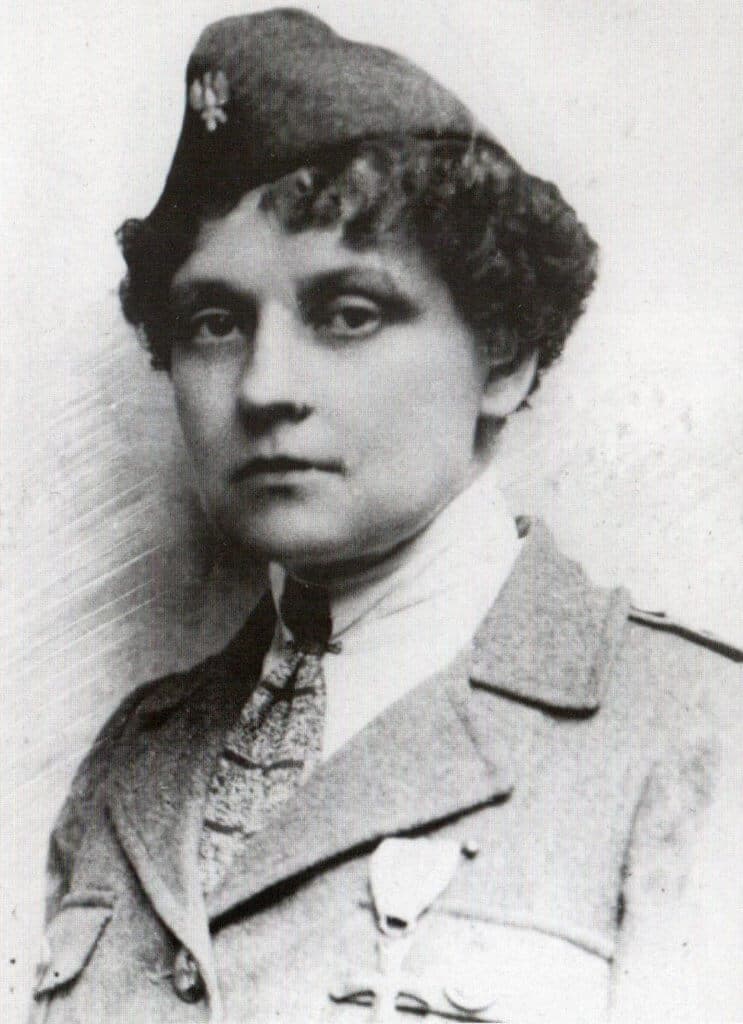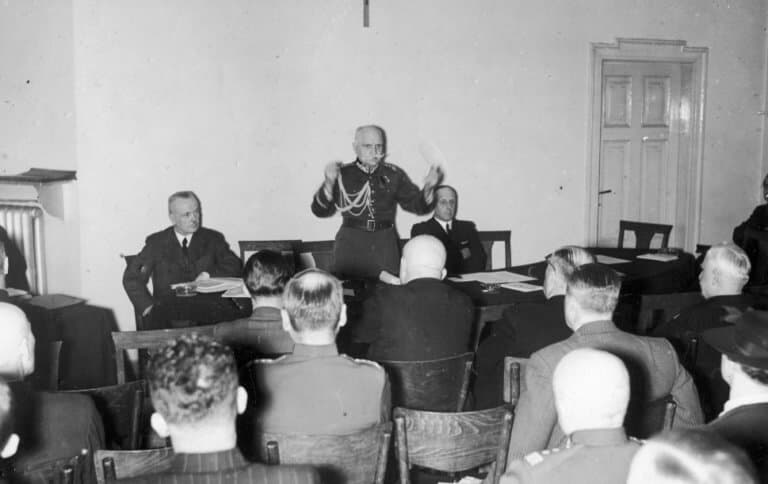PCK has never accepted any gratifications nor supported the Hitlerian authorities, thus exposing itself to severe consequences.

It is worth recalling the beautiful, civic attitude of the activists of the Polish Red Cross, who carried out their difficult and tragic mission with a sense of patriotic and humanitarian duty.
During World War II, the Polish Red Cross was engaged on a massive scale in organizing aid for the civilian population, while simultaneously struggling with many difficulties, mainly financial and harassment from the German authorities. One of these was, among others, a proposal to fund the Polish Red Cross from the revenues of the casino on Al. Szucha (by the decision of the General Governor Frank). The Polish Red Cross formally declined to accept income from the casino (motive – immoral gambling), which resulted in a visit to the Main Board of the Polish Red Cross from representatives of the German authorities, including the SD and Gestapo, who stated that G. G. Frank felt offended and wanted to know who was responsible for such a decision. Maria Tarnowska – the vice-president of the Polish Red Cross, who was delegated to contact with the Germans, recalls this incident: “Soon after the opening of this gambling den [the casino], an employee of the Warsaw office of General Governor Frank appeared at the headquarters of the Red Cross. He inquired about me. He announced that he was arriving with a message from his superior, who, hearing about the financial difficulties of our organization, decided to give it ten percent of the casino's income. I was outraged by this proposal.

– I am grateful to the governor for his kindness – I replied – but we cannot accept the donation.
– Why? – The reaction of my interlocutor was typical of Germans, who could not understand the feelings of others.
– Because the source of income is highly immoral, and therefore the people to whom we are obliged to help, would undoubtedly resent us for the silent support of the gambling casino.
– Are you at the head of the Polish Red Cross? – asked the envoy.
– No, I am the vice-president. The organization is led by Mr. Lachert.
– In that case, please call him here – he announced.
I then asked the chairman, who gave the German the same answer” (pp. 125-126).
A few days later, the Nazi authorities summoned the PCK presidium to Krakow, where G.G. Frank’s deputy categorically prohibited the acceptance of new PCK members and the collection of membership fees, allowing only for voluntary donations – which was intended to lead to the collapse of the organization. Furthermore, he ordered the dissolution of all District and Branch Boards, agreeing to leave only one representative of the Main Board in the Districts and Branches, and to move the headquarters of the Main Board to Krakow (this last order was successfully changed by establishing a delegate of the PCK in Krakow). Then, upon returning to Warsaw, members of the PCK Presidium were informed that it was the government's wish, or rather instruction, that the position of President of the Main Board of the PCK be taken by Mr. Landsberg. In connection with this decision, a refusal was adopted, arguing that the currently serving President Lachert was appointed by the election of the Supreme Council and enjoys the trust of Polish society and that the Polish Red Cross will not take any steps towards choosing a President indicated by the Germans, especially since the current composition of the PCK Board had been notified to the International Red Cross in Geneva.
Another interesting account describing the relations of the Polish Red Cross with the German authorities is the account of Wacław Lachert – President of the PCK, who wrote: “I still remember my two trips to Krakow at the invitation of the German authorities. The first of them was aimed at designing a trip for PCK representatives to the prisoner of war camp in Murnau. Since I learned that P. Ronikier was also invited to the conference, I spoke to him a moment before the meeting and sensed that he was enthusiastic about this trip promoted by German propaganda. In a few strong words, I countered this enthusiasm, and despite R. having promised the Germans his participation in the trip to Murnau, I categorically refused our participation. My secretary of the Main Board, Mr. Kazimierz Skarżyński, bravely supported me, as he always did, and after listening to the exceptionally polite invitation to the trip to Murnau from the president of the German propaganda, I took the floor, warning Mr. Ronikier out of concern that he might become involved, thanked for the invitation, and firmly declined our participation in it, stating that PCK, systematically deprived of its rights by the orders of the German authorities and even deprived of responses to repeated protests regarding the arrests of Red Cross activists, death sentences on those interned in camps (the case of the Castellan and many others) would rather want to know what is happening in Dachau, Auschwitz, Majdanek, and other prisons, and not visit their countrymen in the model camp of Murnau to please German propaganda objectives.
PCK has significant moral capital in Polish society and has no intention of losing it so recklessly by participating in such events. The president of German propaganda was surprised by the position of the PCK, said that he did not understand it, but had to leave it at that, while the chairman at the meeting, a representative of the care department (I don't remember the name), asked us to submit our protests and resolutions in writing, which would be considered. An extensive memorandum on this matter, sent a few days later by us, remained as always without effect and even without a response.

The Polish Red Cross also did not allow itself to be drawn in the slightest to the wheels of German propaganda during the discovery of the Katyn massacre, rightly understanding that since the Soviet Union was waging war with Hitler's Germany, regardless of situational arrangements and its own perspective on the events of 1940 and 1941, it was forbidden to assist German propaganda in any way. This responsible position was reflected in the fact of the unequivocal refusal of the PCK given to the Nazi authorities (despite the threat of the most severe consequences) to publicly specify in any form the date of the crime. As is known, specifying the date of the Katyn massacre simultaneously indicated the perpetrators, which the Polish Red Cross, as an impartial organization, could not do.
Prepared on the basis of:
Maria Tarnowska "The Future Will Show…", Łomianki edition 2012.
Confidential report of the Polish Red Cross. Report from Katyn.
Facts about the Polish Red Cross
Only after the fourth request to the International Red Cross was the Polish Red Cross recognized on the international stage.
The beginnings of blood donation in the Red Cross date back to 1935, which took place 83 years ago.
If the borders of Poland had not been changed after World War II, the 100th anniversary of the Polish Red Cross (PCK) would have been celebrated with the Lviv, Volhynian, and Wilno branches, which are still active today but under the structures of different state associations.
The employees of the Polish Red Cross carried out the exhumation of Polish officers murdered in the Katyn Forest while also being responsible for creating the official Katyn Lists
The Red Cross movement and its foundations were the source for the establishment of sanitary services for wounded soldiers under the names Polish White Cross and Polish Green Cross.
Over the years, the rules for statutory financing of the PCK's activities have changed, as has our role and position within the state.
The PCK enjoyed immense public trust during the Second Polish Republic, and the most important figures in the state always spoke about our organization with the utmost respect.
To this day, in Tarnów, Małopolska, there is a nearly 100-year tradition of parades through the city organized on the occasion of the Polish Red Cross Week.
On February 8, 2018, it was 50 years since the establishment of the badge of the Honorable Blood Donor
On February 8, 2018, it marked 50 years since the establishment of the badge of the Meritorious Honorary Blood Donor
PCK never accepted any gratifications and did not support the Nazi authorities, thereby exposing itself to severe consequences.
The Polish Red Cross was the initiator of healthcare in rural areas during the interwar period and the establishment of the first village health centers.
PCK was involved in the construction of the Marshal Piłsudski Mound in Sowińca in Krakow in 1936
At the beginning of 1919, within the structures of the newly established Polish Red Cross Society, 3 District Branches of the PTCK were created: for Galicia, the Grand Duchy of Posen, and Silesia.
During its 100-year activity, the Polish Red Cross, the International Committee of the Red Cross, honored 102 Polish nurses associated with our organization with the Florence Nightingale Medal.
The Polish Red Cross was the organizer of parachuting courses
Did two Polish doctors working at the Red Cross hospital during World War II save more lives than Oskar Schindler?
There existed simultaneously the Polish Red Cross and the Polish White Cross, whose president was Helena Paderewska.
There was a time in the history of PCK when, legally, two or even three Main Boards of PCK operated simultaneously.
Help us endlessly
Thanks to the kindness and support of our Donors, we can help children, seniors, support medical rescuers, promote the idea of blood donation, and implement many other projects that save lives in times of conflict or humanitarian crises. Every donation and every form of support is significant because the Polish Red Cross connects those in need with those who want to provide help. Let’s help together!
See also
The Polish Red Cross was the initiator of healthcare in the countryside during the interwar period and the establishment of the first rural health centers.
Despite the expansion of the health center network by the state and local governments, as well as the Social Insurance Institution, residents of the villages acutely felt the lack of medical care. The idea of creating health centers in the villages was proposed by Countess Maria Tarnowska, Vice President of the Polish Red Cross, who was a trained nurse.
The beginnings of blood donation in the Red Cross date back to 1935, which was 83 years ago.
In 1935, the Polish Red Cross began organized activities for blood transfusion, including the organization of courses for doctors and the promotion of blood donation. The first Blood Transfusion Institute in Poland was also established.
You are currently viewing a page filtered by content from the department. Cała PolskaIf you want to view content from Cała Polskaclick the button